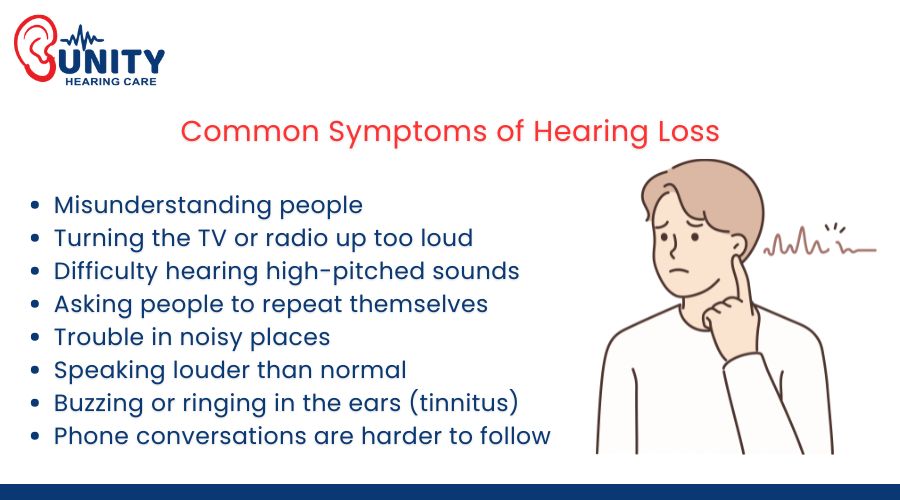What Are Hearing Loss Symptoms? Types, Causes & Treatment
Hearing is a vital part of how we connect with the world around us. From casual conversations to warning signals, our ears play an essential role in our daily lives. But what happens when that ability starts to fade? Hearing loss symptoms can be subtle at first, yet they often signal deeper problems that shouldn’t be ignored.
In this blog, we’ll help you understand the signs of hearing loss, explore the different types and causes, and discuss treatment for hearing problems so you can take proactive steps toward better hearing health.
What Are Hearing Loss Symptoms?
Recognizing the early symptoms of hearing loss can make a significant difference in how effectively the issue is treated. Hearing problems often progress slowly, and many people don’t notice the signs until communication becomes a challenge.

Common symptoms of hearing loss include:
- Misunderstanding people – You hear someone talking but can’t always make out what they’re saying, especially in groups.
- Turning the TV or radio up too loud – Others might complain the volume is too high, even though it sounds fine to you.
- Difficulty hearing high-pitched sounds – Things like doorbells, birds chirping, or a child’s voice may sound distant or disappear altogether.
- Asking people to repeat themselves – You find yourself saying “What?” or “Can you say that again?” more than usual.
- Trouble in noisy places – Restaurants, family gatherings, or crowded spaces become exhausting to follow conversations in.
- Speaking louder than normal – You may not even realize your own voice has gotten louder as your hearing fades.
- Buzzing or ringing in the ears (tinnitus) – A persistent sound in your ears may be an early warning of hearing damage.
- Phone conversations are harder to follow – Without visual cues, voices can sound unclear or muffled.
If you or a loved one experiences any of the above, it may be time to seek help from a professional. Hearing loss isn’t just an inconvenience—it can impact relationships, mental health, and quality of life.
Types of Hearing Loss
There are several types of hearing loss, and knowing which type you have is crucial to choosing the right treatment.
- 1. Conductive Hearing Loss This occurs when sound waves cannot efficiently travel through the outer or middle ear. It might be due to ear damage, earwax buildup, fluid, or infections. The good news is that conductive hearing loss is often treatable with medication or surgery.
- 2. Sensorineural Hearing Loss This type affects the inner ear or auditory nerve. It is often age-related or caused by noise exposure, genetic factors, or illnesses. Unlike conductive loss, sensorineural hearing loss is typically permanent, but hearing aids can help manage it effectively.
- 3. Mixed Hearing Loss As the name suggests, mixed hearing loss is a combination of both conductive and sensorineural loss. This often requires a more comprehensive treatment plan.
Causes of Hearing Loss
Hearing loss doesn’t have a single cause—it can result from a variety of factors, either gradually or suddenly.
Here are some common causes of hearing loss:
- Aging: The most frequent cause, known as age-related hearing loss, typically affects people over 60.
- Loud Noise Exposure: Long-term exposure to loud sounds can damage the inner ear and lead to permanent hearing loss.
- Infections or Illnesses: Ear infections, Meniere’s disease, or even a high fever can lead to sudden hearing loss.
- Injuries or Trauma: Head injuries or ear damage from accidents may also affect hearing.
- Ototoxic Medications: Some medications can negatively affect the ear’s structures.
- Genetics: Hereditary factors can predispose individuals to hearing impairment from an early age.
Treatment Options for Hearing Loss
When it comes to treatment for hearing problems, early diagnosis is key. The appropriate solution depends on the type and severity of your hearing loss.
- 1. Hearing Aids : For many, especially those with sensorineural hearing loss, hearing aids are a reliable solution. Advanced hearing aids—like those offered at Unity Hearing Care—are discreet, customizable, and equipped with features such as Bluetooth connectivity and noise reduction.
- 2. Medical or Surgical Treatment : Conductive hearing loss might be treatable through medical procedures. This could include removing a blockage, treating an infection, or undergoing surgery to repair structural damage.
- 3. Cochlear Implants : In cases of severe to profound hearing loss where traditional hearing aids don’t help, cochlear implants might be recommended. These electronic devices stimulate the auditory nerve directly.
- 4. Tinnitus Therapy : Many individuals experience ringing or buzzing sounds, commonly known as tinnitus. Specialized hearing aids and sound therapy can offer relief.
Prevention and Hearing Care Tips
While some hearing problems are unavoidable, many are preventable with the right habits. Here are a few tips to protect and improve hearing:
- Limit exposure to loud noises and wear protective earplugs in noisy environments.
- Keep ears clean but avoid inserting objects like cotton swabs deep into the ear canal.
- Schedule regular hearing check-ups, especially if you're over 50.
- Use volume-limiting features on headphones and audio devices.
- Address ear infections promptly.
Small lifestyle changes can go a long way in preserving your hearing health.
When to Visit a Hearing Specialist
If you’ve noticed that you’re having difficulty hearing conversations, especially in crowds, or if you constantly ask people to repeat themselves, don’t wait. Early detection can prevent further ear damage and improve your chances of finding effective solutions for hearing problems.
If you're concerned about a person who can't hear, encourage them to get their hearing evaluated. Many people delay treatment, thinking their hearing loss isn’t serious, but it can lead to isolation, depression, and cognitive decline.
Why Choose Unity Hearing Care for Your Hearing Health?
Unity Hearing Care offers comprehensive solutions for individuals experiencing hearing difficulties. From hearing tests to customized hearing aid fittings, their expert audiologists use cutting-edge technology to help patients regain confidence in daily communication.
Whether you're dealing with sudden hearing loss or looking for long-term treatment for hearing problems, Unity Hearing Care provides a supportive and professional environment for your journey toward better hearing.
We also specialize in:
- Pediatric and adult hearing care
- Digital and rechargeable hearing aids
- Tinnitus management
- Speech-language therapy support
Conclusion
Hearing loss can affect anyone, but understanding the symptoms, types, and causes of hearing loss is the first step to taking control. With the right care and support, you can maintain a high quality of life and continue enjoying the sounds that matter.
If you or someone you love is struggling with hearing, don’t wait.
Schedule your hearing test today with Unity Hearing Care and take the first step toward better hearing health.
FAQs
1. What are the first signs of hearing loss?
Early signs include difficulty following conversations, turning up the TV volume, and asking people to repeat themselves.
2. How can I prevent hearing loss?
Protect your ears from loud noises, maintain ear hygiene, and get regular hearing check-ups, especially after age 50.
3. What are the main types of hearing loss?
Hearing loss can be conductive, sensorineural, or mixed, each requiring different treatment approaches.
4. Why choose Unity Hearing Care for hearing problems?
Unity Hearing Care provides expert testing, advanced hearing aids, and personalized tinnitus and speech therapy solutions.


